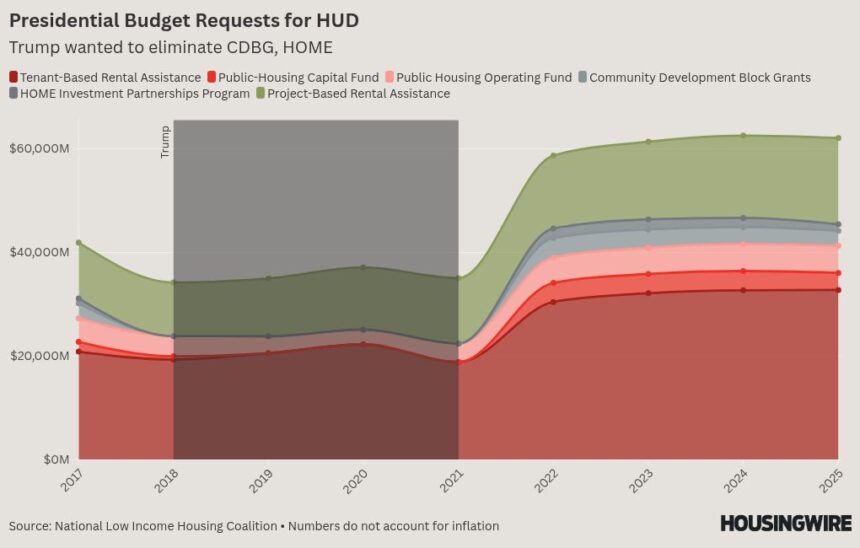President Donald Trump has wasted no time implementing his agenda, having signed a flurry of executive orders and memos last week, including some that have a direct impact on the housing industry.
He began last week with a memo calling for a blanket freeze on foreign aid and federal grants. A day later, he called for a review of thousands of government programs, including 100 programs administrated by the U.S. Department of Housing and Urban Development (HUD).
Presidential memos are not legally binding and effectively serve as a letter of intent. Two federal judges have placed a hold on the memo that freezes foreign aid and grants. Still, the memos show that the Trump administration is in the process of reviewing what is effectively the entire existence of HUD.
“My expectation is that the Trump administration is going to use every single opportunity to undermine federal investments in housing and homelessness,” said Sara Saadian, senior vice president of public policy and field organizing for the National Low Income Housing Coalition (NLIHC). “We will likely see other attempts to rescind or withhold congressionally approved funds.”
Whether Trump disapproves of some or all of HUD’s programs remains to be seen, but his first-term budget requests provide clues to how he might act. Presidents initiate the federal budget process by submitting a request to Congress, which then negotiates among itself on a final budget for the president’s approval.
According to analysis by the NLIHC, Trump’s budget requests asked for cuts to HUD of 15% to 18% relative to the prior year’s final allocations.
Trump’s requests included dramatic cuts to the major programs administered by HUD, including the elimination of Community Development Block Grants (CDBGs), the HOME Investment Partnerships and the Public Housing Capital Fund.
Relative to President Barack Obama’s final budget request for fiscal year 2017, and in addition to previous final allocations for HUD programs, Trump requested cuts to other major programs such as the Public Housing Operating Fund, Projected-Based Rental Assistance and Tenant-Based Rental Assistance — or housing vouchers.
Trump didn’t get much of what he wanted in the final budgets approved by Congress, which more or less held funding steady compared to the previous year’s allocations. CDBG, HOME and the Public Housing Capital Fund survived, with funding hovering around $3.4 billion, $1.3 billion and $2.8 billion, respectively.
In raw dollar amounts, funding for other HUD programs remained mostly steady relative to the previous year’s final tallies.
But comparing funding levels between Trump’s last budget in 2021 and that of fiscal year 2024 tells a different story. In these years, under the Biden administration, rental assistance programs received significantly more funding, with housing vouchers increasing by $6.6 billion and Project-Based Rental Assistance jumping by $2.5 billion.
The raw dollar amounts are somewhat misleading due to inflation, which skyrocketed after the COVID-19 pandemic. The rapid rise in rents after COVID also distorts the nominal increase in rental assistance. These factors actually resulted in fewer households receiving housing vouchers, and those who did get vouchers still had to grapple with higher rents.
Comparing 2021 and 2024, the Public Housing Capital Fund ($468 million) and Operating Fund ($637 million) received modest funding increases that likely amounted to decreases when accounting for inflation. CDBG and HOME saw funding cuts of $175 million and $100 million, decreases that were also exacerbated by inflation.
While the budget process would normally prevent any immediate cuts to HUD as a result of the change in administration, some in government fear that the process could be circumvented by Trump confidant Elon Musk, who has reportedly been given access to the Department of the Treasury’s payment system. This system passes congressionally appropriated funding to HUD.
While it’s unclear the extent to which he’s been given control to shut off funding to individual programs, Musk over the weekend said that, through the system, he was halting payments to federal contractors and to a Lutheran charity in South Dakota. He’s made similar overtures since then.
And Trump’s moves have also disrupted the process. Gothamist reported that rental assistance payments to landlords in New York City were delayed as a result of Trump’s memos last week, although it appears they have since gone through.
Politically, HUD has never been a big priority for Republicans or Democrats, as evidenced by the department’s stagnant budget. But CDBGs are extremely popular because they can be allocated to a variety of different uses, including affordable housing, economic development and transportation.
Allocations go out to thousands of state and local governments and other municipal entities. If Trump tries to eliminate CDBGs entirely — as he did during his first term — he could face significant opposition from Republicans and Democrats alike.






